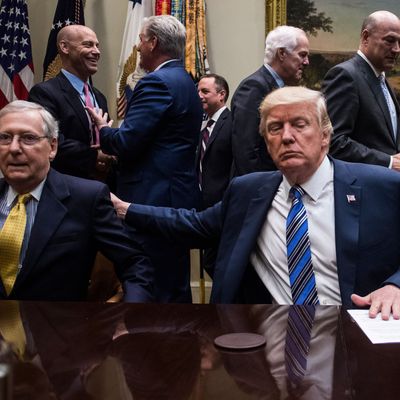
In public, Republicans have been lambasting Democrats for obstructing the majority party on health care. In private, their message is the opposite: Mitch McConnell’s goal is to lock Democrats out of the process, and the failure of a Republican-only bill would force them to work together with the minority party. “McConnell is warning Republicans that there’ll be a political and policy price to pay if health care goes down — that failure would have painful implications … if the Better Care bill fails, Rs will have to work with Ds (horrors!) later this year to help shore up the exchanges,” reports Mike Allen. Politico reports the same: “McConnell is delivering an urgent warning to staffers, Republican senators and even the president himself: If Obamacare repeal fails this week, the GOP will lose all leverage and be forced to work with Chuck Schumer.”
Obviously, a bipartisan bill would have very different parameters. Democrats are not going to support a huge tax cut for the affluent or a plan to cut insurance subsidies by a trillion dollars. On the other hand, the thing Democrats would happily do also happens to offer enormous political benefits for the majority party.
If Donald Trump’s candidacy has made nothing else clear, it’s that Republican voters have little attachment to right-wing economic doctrine. They hate “Obamacare,” but they favor many of its specific elements, especially Medicaid. What they want is a bigger plan, not a smaller one. Republicans have denounced high premiums and deductibles, and Trump ran promising to make sure everybody had better coverage than they get under Obamacare.
Republicans have no obviously safe option. Failing to pass any bill would demotivate conservative activists. Passing anything like the House or Senate bills would probably be worse, saddling the party with sole responsibility for a health-care system with massively unaffordable premiums and deductibles.
The way out of the vise is to share responsibility for the system with Democrats by passing a bipartisan bill. This would force Republicans to abandon their policy goals of cutting taxes and shrinking government. But it would spare them having to defend an indefensible health-care system for the next several election cycles in a row. (Indeed, the odds that Republicans can hold onto enough power to defend a right-wing health-care plan that lacks either Democratic support or even a modicum of public legitimacy is small; eventually, Democrats will undo their cuts, and the policy gains under Trumpcare will be short-lived.)
Major legislation almost always needs some kind of patching up in the months and years after initial passage. Republicans have blocked any measures, however small or noncontroversial, to make the law work, and they have also sabotaged it at the state level. But health-care wonks have a long list of easy fixes that could bear fruit if Republicans simply gave up their determination to make it fail. People like bipartisanship, and they also like government-provided insurance. A bipartisan plan to “replace” Obamacare with a bipartisan law very similar to Obamacare would have very high approval, however bitterly conservatives might complain about it.
The most attractive thing about this option is that the Democratic minority is actually willing to play ball. From a pure political standpoint, the Democrats have a win-win choice. They’ll gain if Trumpcare fails in Congress, and they’ll gain even more if it is signed into law. The only way they won’t score political points off the issue is if they join with Republicans to patch up the system. And yet many and perhaps most Democrats are probably willing to make this sacrifice for the same reason they took the risk of voting for Obamacare in the first place: They care a lot about health-care policy outcomes, and are willing to sacrifice seats to pursue them.
When Democrats were writing the health-care law in 2009 and 2010, they spent months wooing Republicans in an attempt to get bipartisan support. Republicans formed a united front of opposition, because both their political and their ideological interests dictated withholding any bipartisan cover from the bill.
Republicans writing their own bill today have the option of working with the minority party, but are refusing to take it. In a way, it is admirable that they care more about policy outcomes than winning elections. But it also strange and uncharacteristic. A Washington Post story about the relationship between Trump and McConnell sheds some light on their shared determination to pass a Republican-only law. “Their antipathy for Democrats and hunger for victory,” the Post reports, “rather than ideology or a personal connection, is what unites them, those close to them say.”
For McConnell to compromise with Democrats and patch up the system would be for him to surrender the anti-Obamacare crusade on which he embarked in 2009 and from which he has never wavered. He may simply have too much pride and anger invested in the fight to give it up now. But he and his party — especially colleagues in the House — are going to pay a dear price for his monomaniacal hatred of a now-popular law.






























